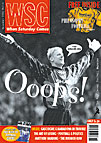 Mike Ticher explains why some Chelsea fans, himself included, feel that the tributes paid to Matthew Harding struck the wrong note
Mike Ticher explains why some Chelsea fans, himself included, feel that the tributes paid to Matthew Harding struck the wrong note
Reading the newspaper tributes to Matthew Harding in the days after his death, it was hard not to be struck by how easily the bare facts of his life could have been presented to paint an entirely different picture of the man.
He had recently left his wife and four children for a woman 17 years younger. He claimed to one journalist he had “more love children than you’ve had hot dinners”. His most celebrated gesture while on the board at Chelsea was to charter a plane at a cost of £27,000 to fly him back from Morocco in time to watch a cup tie at Newcastle.
If circumstances had been different, it’s not hard to see how the newspapers could have turned his domestic affairs and occasional extravagance against him. If, say, his millions had turned out to have the same credibility as Robert Maxwell’s. Or if the tabloids had decided to back Ken Bates during their battle last year.
Needless to say, that would have been a very unfair portrayal. But it wouldn’t necessarily have been much more inaccurate than the almost unreserved adulation which was heaped on Harding after his death. He was, wrote the ubiquitous David Baddiel, “the friendliest man in the world”. His three-year financial involvement in the club apparently entitled him to be called “Mr Chelsea”, a tag which Bates would be justified in privately resenting. He was “the people’s tycoon” and the “saviour” of Chelsea.
Such fulsome tributes did less than justice to Harding. He was no saint, and certainly not a starry-eyed benefactor. The money he put into Chelsea was an investment, for which he was already getting a handsome return. That’s not a criticism. First, it was his right to do so. Second, it benefited the club enormously, perhaps more so than if the money had been a gift.
Yet this point, among many others, was lost in the flood of fawning articles which elevated Harding to such untouchable status. Why? The one key recurring phrase, surely, was that he was at heart “one of the lads”. He loved (in no particular order) drinking, football, women and making money. But for his devotion to Bob Dylan, he would have been the perfect role model for readers of Loaded. “I don’t believe in women going to games,” he once said half-jokingly (but isn’t it always?).
Harding’s life virtually defined the boundaries of acceptable laddishness at a time when nothing could be more fashionable. As the Guardian’s Matthew Engel pointed out in one of the few level-headed profiles: “This is Britain in the 1990s. A Labour-supporting multi-millionaire who liked a beer with the lads and put his wealth into football seems like an authentic hero.”
Despite a fondness for startling public gestures with his money, all the accounts of Harding’s friendly and generous attitude towards ordinary fans ring true. He clearly did not do what he did at Chelsea out of a craving for the limelight. Rather, as Ken Bates himself pointed out in his programme notes for the Tottenham game, Harding “wanted to be loved by everyone, had many acquaintances but had few close friends”.
Which is why Harding was not a hero, for heroes can’t afford to be loved by everyone. They have to upset people’s expectations of them and stand by unpopular positions. They have to change engrained mindsets, not reinforce them. One of the strangest cameos in the days after his death was the laying of flowers in his memory at Stamford Bridge by members of the Chelsea Headhunters. Somehow, being mourned by self-proclaimed hooligans was interpreted in the media as another plus point for Harding.
Indeed, much was made of Harding’s ability to mix easily with Chelsea fans, having spent years standing in The Shed as well as the period of enforced exile in the North Stand during his row with Bates. That was justifiably read as a testament to his lack of pretension, despite the fabulous wealth. But it also means he could have been under no illusions as to the fans’ faults as well as their virtue of following Chelsea as fanatically as he did.
Thanks to the status he held among them, Harding was in a unique position to influence behaviour at Stamford Bridge, and there were more difficult challenges at Chelsea than investing vast amounts of money and spreading general bonhomie. As chance would have it, the first game after Harding’s death was the one date remaining in Chelsea’s fixture list when mass racist chanting is still the norm.
What a fantastic tribute it would have been to him if the club had taken advantage of the emotion of the day to finally suffocate the vicious tirades against the ‘yids’ from fans (many wearing black armbands in Harding's memory) which poisoned the occasion as they have every Chelsea-Tottenham game for three decades.
But Harding left no unambiguous legacy which Chelsea could invoke to make Stamford Bridge a genuinely friendlier place for people who don’t already share the values or the skin colour or the gender of the bulk of their fans. Perhaps he wanted to be one of the lads too much for that.
From WSC 118 December 1996. What was happening this month